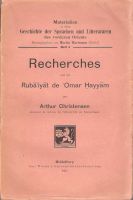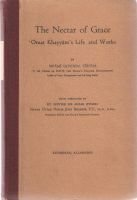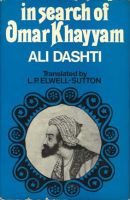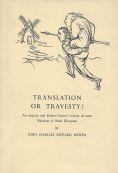Recherches sur les Rubá’iyát de ‘Omar Hayyám. Par Arthur Christensen. Heidelberg, Carl Winters Universität, 1905.
Contents:
Préface
Première partie. Histoire et critique
Deuxième partie. Caractère national et vie littéraire
Troisième partie. L’oeuvre intitulée “Rubá’iyát de ‘Omar Hayyám”
Appendice I. Concordance des principales éditions et de quelques manuscrits des Rubá’iyát de ‘Omar Hayyám
Appendice II. Additions
Corrections



